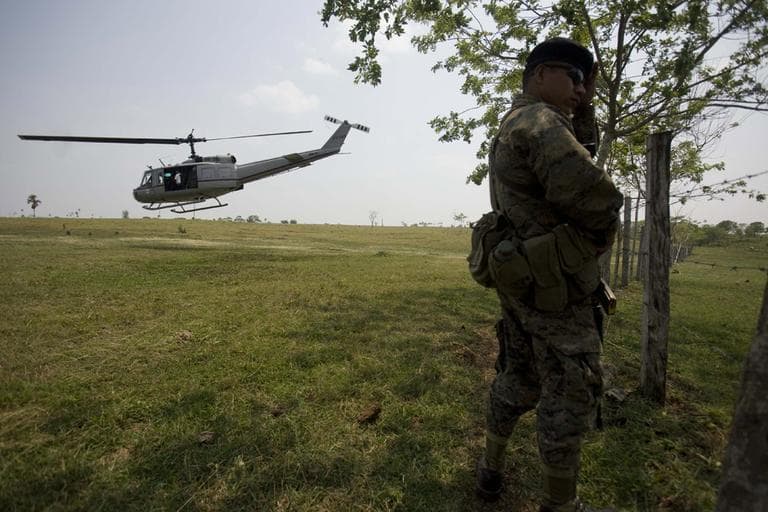Advertisement
After Massacre, Guatemala Fears Drug War

President Alvaro Colom oversaw hundreds of Guatemalan soldiers and police in a house-by-house search Tuesday for the killers of 27 cattle ranch workers, while schools and businesses shut down in the terrified jungle town.
Colom arrived in the region to direct operations aimed at rooting out members of the Mexican Zetas drug cartel that has moved into the northern province of Peten, a heavily forested area along the Mexican border.
"This was total savagery," Colom told Mexico's MVS Radio on Tuesday. "These poor people were laborers. There was no evidence they had weapons. They were just peasants who had just arrived from the eastern region of the country."
Colom said that 25 of the 27 victims in the Saturday night-Sunday morning attack had been decapitated and police are investigating whether kaibiles, Guatemalan soldiers trained in counterinsurgency methods, were involved. Mexican officials warned in 2005 that the Zetas were recruiting such veterans.
Colom said three survivors are helping authorities in their search.
Authorities in Peten ordered all classes suspended Tuesday in the municipality that includes the village of San Benito, where the killings took place. Streets were deserted and most businesses remained closed.
A resident of Santa Elena, the seat of the municipality, said he had opened the door to police officers who were searching homes late Monday for suspects when an assailant in the street threw a grenade at them.
"I opened the door and suddenly there was an explosion," said the man, who gave his name only as Diego for fear of reprisals. "I'm afraid. Life has become impossible here."
A man who was arrested and two who were killed during police raid had moved to the neighborhood less than a month ago, Diego said.
"They didn't look Mexican, they spoke like us ... I never saw them armed," he said
Colom declared a state of siege during a message broadcast to the nation late Monday.
Such declarations give the army emergency powers, including permission to detain suspects without warrants.
The attack on the isolated cattle ranch was of one of Guatemala's largest massacres since end of its 36-year civil war in 1996.
Gunmen rounded up workers and took them one by one to be killed, grilling them about the location of the ranch owner, survivors said. Severed heads were left scattered across the pastures. A message written in the blood of the victims was daubed across a wall of the ranch house, threatening the owner, Otto Salguero.
Colom said police are trying to determine if Salguero, who owns four ranches and hundreds of cattle, had ties to drug trafficking. His whereabouts were not known.
The Zetas are blamed for two recent mass killings in Mexico as well, 183 bodies found in mass graves last month and a massacre of 72 migrants last August, both in the state of Tamaulipas bordering Texas.
Mexican drug cartels have increasingly spread into parts of Central America, a region where corruption is rampant, borders lack even minimal immigration control and local gangs provide a ready-made infrastructure for organized crime.
The 2010 U.N. World Drug Report says both the Zetas and Mexico's Sinaloa cartel have interests in Peten and may be competing for territory and for use of small airstrips near the border.
The Guatemalan government recently ended a two-month siege in the neighboring mountainous state of Alta Verapaz, also a prime corridor for smuggling drugs from Honduras to Mexico. The Zetas there had roamed the streets with assault rifles and armored vehicles and even controlled when people could leave their homes.
This program aired on May 17, 2011. The audio for this program is not available.